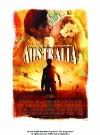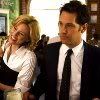
Director Baz Luhrman, the visionary behind films such as Romeo+Juliet and Moulin Rouge, teams up with his favorite Australian stars to tell a story about their homeland.
 Lady Sarah Ashley (Nicole Kidman), an aristocrat from England, is on her way to Northern Australia to find her husband, who owns a cattle ranch. She discovers he has been brutally murdered by King George (David Gulpilil), an Aboriginal "magic man." His grandson, Nullah (Brandon Walters), is a half-white, half-Aborgine who works at the ranch with his mother. Sarah doesn't believe the boy's grandfather killed her husband, and when she realizes King Carney (Bryan Brown) and his help Fletcher (David Wenham) are stealing her cattle and trying to force her to sell the ranch, she realizes she sits on a great piece of property.
Lady Sarah Ashley (Nicole Kidman), an aristocrat from England, is on her way to Northern Australia to find her husband, who owns a cattle ranch. She discovers he has been brutally murdered by King George (David Gulpilil), an Aboriginal "magic man." His grandson, Nullah (Brandon Walters), is a half-white, half-Aborgine who works at the ranch with his mother. Sarah doesn't believe the boy's grandfather killed her husband, and when she realizes King Carney (Bryan Brown) and his help Fletcher (David Wenham) are stealing her cattle and trying to force her to sell the ranch, she realizes she sits on a great piece of property. She decides to give Carney some competition to break his monopoly of the meat business, especially considering the big contracts with the war-time military. She hires Drover (Hugh Jackman) to help her drive about 2000 heads of cattle to Darwin so she can sell them to the military. On their way, Fletcher sabotages them. They prevail, however. Sarah and Drover become romantically involved.
She decides to give Carney some competition to break his monopoly of the meat business, especially considering the big contracts with the war-time military. She hires Drover (Hugh Jackman) to help her drive about 2000 heads of cattle to Darwin so she can sell them to the military. On their way, Fletcher sabotages them. They prevail, however. Sarah and Drover become romantically involved. Sarah wants to keep Nullah as her son, against the town's objection as well as Drover's. After a heated argument about their future, Drover leaves. Nullah is taken away. During that time, the Japanese attack northern Australia and threaten to break up Sarah, Drover and Nullah forever.
Sarah wants to keep Nullah as her son, against the town's objection as well as Drover's. After a heated argument about their future, Drover leaves. Nullah is taken away. During that time, the Japanese attack northern Australia and threaten to break up Sarah, Drover and Nullah forever. Nicole Kidman (The Golden Compass) is in fine form as Lady Ashley. She shows some over-the-top, broad comedic ability at the beginning, but its her dramatic moments that remind us why she is a star. She also has great chemistry with Hugh Jackman (Wolverine), who flaunts his leading man physicality and charisma in every scene. They work particularly beautifully in the first half of the film.
Nicole Kidman (The Golden Compass) is in fine form as Lady Ashley. She shows some over-the-top, broad comedic ability at the beginning, but its her dramatic moments that remind us why she is a star. She also has great chemistry with Hugh Jackman (Wolverine), who flaunts his leading man physicality and charisma in every scene. They work particularly beautifully in the first half of the film. Newcomer Brandon Walters is excellent as Nullah, the boy who is central to the racial struggle in the story. Walters is mischievous, genuine and energetic in his role. As his native grandfather, King George, David Gulpilil (Crocodile Dreaming) spends most of his time chanting or being silent, but he exerts certain authority. Bryan Brown (Cactus) has a relatively small role. He does his best with the two-dimensional "tycoon" role. David Wenham (300) is marvelously evil as Neil Fletcher, who schemes his way to success at the expense of everyone else.
Newcomer Brandon Walters is excellent as Nullah, the boy who is central to the racial struggle in the story. Walters is mischievous, genuine and energetic in his role. As his native grandfather, King George, David Gulpilil (Crocodile Dreaming) spends most of his time chanting or being silent, but he exerts certain authority. Bryan Brown (Cactus) has a relatively small role. He does his best with the two-dimensional "tycoon" role. David Wenham (300) is marvelously evil as Neil Fletcher, who schemes his way to success at the expense of everyone else. Written by Baz Luhrmann (Moulin Rouge), Stuart Beattie (30 Days of Night), Ronald Harwood (Love in the Time of Cholera) and Richard Flanagan (Moulin Rouge), the story is an aggressive "epic." The arc follows a traditional three-act structure, and it is a very conventional approach. In a way, the whole thing is a big cliche, and the characters are all archetypical. Let's see: the dashing, rough hero; the spoiled but beautiful heroine; the innocent boy who is pure and lovable; the conniving villains; the amiable sidekicks. Even the dialogue is taken from the rule book. There's not much originality here, but the writing works in that context. If you're expecting something warm and fuzzy and familiar, the screenwriters achieve exactly that.
Written by Baz Luhrmann (Moulin Rouge), Stuart Beattie (30 Days of Night), Ronald Harwood (Love in the Time of Cholera) and Richard Flanagan (Moulin Rouge), the story is an aggressive "epic." The arc follows a traditional three-act structure, and it is a very conventional approach. In a way, the whole thing is a big cliche, and the characters are all archetypical. Let's see: the dashing, rough hero; the spoiled but beautiful heroine; the innocent boy who is pure and lovable; the conniving villains; the amiable sidekicks. Even the dialogue is taken from the rule book. There's not much originality here, but the writing works in that context. If you're expecting something warm and fuzzy and familiar, the screenwriters achieve exactly that. Luhrmann doesn't deny that he wants to make the Australian version of Gone with the Wind. In many ways, that's exactly what he accomplishes: the sweeping landscapes, the vibrant colors, the swelling music, the high drama, and the grand romance. There are no surprises -- the characters are exactly what you expect them to be, and the plot goes exactly where it's supposed to go. But when it works, it works tremendously. The first half of the film, with its broad comedy, action, adventure and brooding romance, is exciting and visually arresting. Luhrmann has a unique visual and storytelling style that is evident throughout the film.
Luhrmann doesn't deny that he wants to make the Australian version of Gone with the Wind. In many ways, that's exactly what he accomplishes: the sweeping landscapes, the vibrant colors, the swelling music, the high drama, and the grand romance. There are no surprises -- the characters are exactly what you expect them to be, and the plot goes exactly where it's supposed to go. But when it works, it works tremendously. The first half of the film, with its broad comedy, action, adventure and brooding romance, is exciting and visually arresting. Luhrmann has a unique visual and storytelling style that is evident throughout the film. However, it also seems like there are three movies in one, not in visuals but in tone. The first act is comedic and story-bookish. Then the tone becomes more somber and more action-packed during the middle, and the comedy disappears. The last act of the film is over-the-top romantic and melodramatic, to the point of being cheesy and over-produced. At nearly three hours, the film also feels long. It almost seems like the last act is redundant, or a way to make it more epic by introducing the Pacific War. I almost feel like the film should have ended at the end of the second act, and it would have been a much stronger film. As is, the last act feels overdrawn, melodramatic and at times just silly. It doesn't move me the way Luhrmann intends. At least not as much as it does in the second act. Luhrmann seems very inconsistent in terms of the tone and themes (love, war, racial prejudice, adventure, history, etc.) -- it's as if he doesn't quite know exactly which story to tell, so he tells them all.
However, it also seems like there are three movies in one, not in visuals but in tone. The first act is comedic and story-bookish. Then the tone becomes more somber and more action-packed during the middle, and the comedy disappears. The last act of the film is over-the-top romantic and melodramatic, to the point of being cheesy and over-produced. At nearly three hours, the film also feels long. It almost seems like the last act is redundant, or a way to make it more epic by introducing the Pacific War. I almost feel like the film should have ended at the end of the second act, and it would have been a much stronger film. As is, the last act feels overdrawn, melodramatic and at times just silly. It doesn't move me the way Luhrmann intends. At least not as much as it does in the second act. Luhrmann seems very inconsistent in terms of the tone and themes (love, war, racial prejudice, adventure, history, etc.) -- it's as if he doesn't quite know exactly which story to tell, so he tells them all.Don't get me wrong. As conventional and cliched as it is, Australia is exciting, entertaining, fun, visually stunning, and has everything you've come to expect from a Hollywood epic. While it has its share of cheese, the cast and crew have done a fine job creating a romantic adventure that is strong on action. And if you're a fan of Luhrmann's visual style and storytelling, you will adore the film. If you're not his fan, you may end up hating the film.
At the very least, we would all want to visit the Australia outback.
Stars: Hugh Jackman, Nicole Kidman, Bryan Brown, David Wenham, Brandon Walters, David Gulpilil
Director: Baz Luhrmann
Writers: Stuart Beattie, Baz Luhrmann, Ronald Harwood, Richard Flanagan
Distributor: 20th Century Fox
MPAA Rating: PG-13 for some violence, sensuality, and brief strong language
Running Time: 165 Minutes
Ratings:
Script – 7
Performance – 8
Direction – 7
Cinematography – 9
Music/Sound– 8
Editing – 8
Production – 9
Total – 7.8 out of 10

 The story begins with Bond (Daniel Craig) in hot pursuit of Mr. White (Jesper Christensen), the man responsible for the death of the woman Bond loves. After capturing and interrogating White, Bond and M (Judi Dench) understand there's a secret organization called Quantum, something even the MI6 does not know, behind all this. A infiltrator tries to kill M, but Bond eventually catches and kills him.
The story begins with Bond (Daniel Craig) in hot pursuit of Mr. White (Jesper Christensen), the man responsible for the death of the woman Bond loves. After capturing and interrogating White, Bond and M (Judi Dench) understand there's a secret organization called Quantum, something even the MI6 does not know, behind all this. A infiltrator tries to kill M, but Bond eventually catches and kills him. Bond's ruthlessness and disobedience put M in an awkward position. She doesn't know if she can trust Bond either. Meanwhile, Bond follows his leads to Camille (Olga Kurylenko), who leads him to one of the members of Quantum, Dominic Greene (Mathieu Amalric). It turns out Greene is supporting a local tyrant in exchange of a piece of dessert. But there's no oil there; so what is Green after?
Bond's ruthlessness and disobedience put M in an awkward position. She doesn't know if she can trust Bond either. Meanwhile, Bond follows his leads to Camille (Olga Kurylenko), who leads him to one of the members of Quantum, Dominic Greene (Mathieu Amalric). It turns out Greene is supporting a local tyrant in exchange of a piece of dessert. But there's no oil there; so what is Green after? When M realizes Bond is out of control, she suspends him. That doesn't stop Bond from going after what he wants -- he asks for help from former agent Mathis (Giancarlo Giannini) and CIA agent Felix Leiter (Jeffrey Wright). It turns out Felix is after Greene as well. Armed with personal vengeance, Bond goes after Greene with or without M's blessing.
When M realizes Bond is out of control, she suspends him. That doesn't stop Bond from going after what he wants -- he asks for help from former agent Mathis (Giancarlo Giannini) and CIA agent Felix Leiter (Jeffrey Wright). It turns out Felix is after Greene as well. Armed with personal vengeance, Bond goes after Greene with or without M's blessing. Daniel Craig (
Daniel Craig ( Judi Dench (
Judi Dench ( But what's a James Bond movie without the Bond girls and super villains? As Camille, Olga Kurylenko (
But what's a James Bond movie without the Bond girls and super villains? As Camille, Olga Kurylenko ( The screenwriting team includes pedigrees such as Paul Haggis (
The screenwriting team includes pedigrees such as Paul Haggis ( This is director Marc Forster's (
This is director Marc Forster's (
 Wheeler (Seann William Scott) and Danny (Paul Rudd) are two 30-something guys whose jobs are to go from school to school selling a crappy sports drink. Wheeler is a habitual womanizer and he actually loves his job. But Danny is having an early midlife crisis and he realizes he's been wasting his life. He tries to "fix it" by proposing to his longtime girlfriend, Beth (Elizabeth Banks), who ends up breaking up with him instead.
Wheeler (Seann William Scott) and Danny (Paul Rudd) are two 30-something guys whose jobs are to go from school to school selling a crappy sports drink. Wheeler is a habitual womanizer and he actually loves his job. But Danny is having an early midlife crisis and he realizes he's been wasting his life. He tries to "fix it" by proposing to his longtime girlfriend, Beth (Elizabeth Banks), who ends up breaking up with him instead. Unable to deal with his identity crisis, Danny acts out his frustration and lands both Wheeler and himself in trouble. They're sentenced to 150 community service by mentoring kids at an organization run by Gayle (Jane Lynch), an ex-junkie-turn-Mother-Teresa. Danny is assigned to a teenager named Augie (Christopher Mintz-Plasse), a socially inept nerd who's into Renaissance reenactments. Wheeler, on the other hand, is assigned to a potty-mouthed kid named Ronnie (Bobb'e J. Thompson).
Unable to deal with his identity crisis, Danny acts out his frustration and lands both Wheeler and himself in trouble. They're sentenced to 150 community service by mentoring kids at an organization run by Gayle (Jane Lynch), an ex-junkie-turn-Mother-Teresa. Danny is assigned to a teenager named Augie (Christopher Mintz-Plasse), a socially inept nerd who's into Renaissance reenactments. Wheeler, on the other hand, is assigned to a potty-mouthed kid named Ronnie (Bobb'e J. Thompson). Danny hates his life, and he hates everything about being an mentor as well. He doesn't care about Augie or anyone else, and he just wants to get the community service over with. Meanwhile, the happy-go-lucky Wheeler is starting to bond with the difficult Ronnie. It turns out Gayle is right, however, that the kids need them just as much as they need the kids.
Danny hates his life, and he hates everything about being an mentor as well. He doesn't care about Augie or anyone else, and he just wants to get the community service over with. Meanwhile, the happy-go-lucky Wheeler is starting to bond with the difficult Ronnie. It turns out Gayle is right, however, that the kids need them just as much as they need the kids. Paul Rudd (
Paul Rudd ( Their counterparts are the nerdy Christopher Mintz-Plasse (
Their counterparts are the nerdy Christopher Mintz-Plasse ( The supporting cast is dutifully typecast: Elizabeth Banks (
The supporting cast is dutifully typecast: Elizabeth Banks ( Written by Rudd, Marino, and director David Wain (
Written by Rudd, Marino, and director David Wain ( The dialogue is a bit lame, though. And many of the situations are not really that funny. The characters are drawn well enough, considering the genre -- we're not going to expect Oscar-calibre writing and acting here, but the actors all do their job, and they're cast exactly for what they do best.
The dialogue is a bit lame, though. And many of the situations are not really that funny. The characters are drawn well enough, considering the genre -- we're not going to expect Oscar-calibre writing and acting here, but the actors all do their job, and they're cast exactly for what they do best.